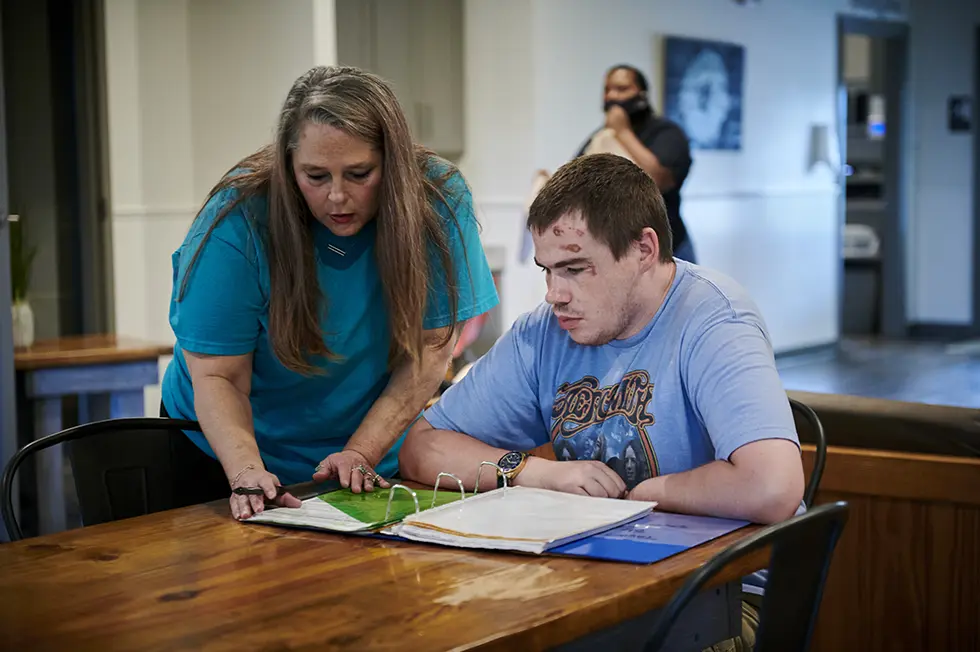What Is a Direct Support Professional?
Direct support professionals are often referred to simply as DSPs. DSPs are usually part of a valued team of other DSPs, nurses and disability professionals who work one-on-one with individuals who may have intellectual, physical or developmental disabilities. The goal is not only to help those individuals with day-to-day activities but also to give them the support and freedom they need to become confident, productive members of their communities. How that happens leaves a lot of room for variation simply because of the wide variety of settings in which a DSP can work and the unique needs and wants of the individuals who need the assistance that DSPs provide.What Does a Direct Support Professional Do?
Since everything a DSP does is tailored to the individual needs and abilities of the person they’ve been matched with, their specific role can shift depending on any number of factors. But this is exactly what draws so many people to the DSP field in the first place. With so many options for work environment, scheduling and who you work with, many people are finally able to find a position that’s actually their perfect fit. When it comes to the average DSP role, here are some typical settings and duties of a DSP:Work Settings for Direct Support Professionals
Individuals with intellectual and developmental disabilities can live in very different settings. They may live in their own homes or apartments, in facilities designed for their special needs, in group homes or at home with their family. However, just because they live in those places doesn’t mean they stay there all the time. A key goal for individuals with special needs is to live as part of their community.
That means that many individuals attend community events, shop at grocery stores or other retail shops, participate in classes or hobbies, and hold jobs. Having a direct support professional with them to assist opens the world to these individuals in a safe and meaningful way.
Responsibilities of a Direct Support Professional
DSPs work one-on-one with many participants. The overarching goal for individuals with special needs is to live a life as independently as possible in the least restrictive environment. To ensure that happens, teams of nurses, doctors and other disability professionals work with disabled individuals to assess their life goals and identify the best ways of reaching them.
These goals are usually formalized in an individual support plan. DSPs, however, are the key ingredient essential for making those goals attainable. DSPs are the ones who give each person the personal, one-on-one support and guidance they need to complete those steps and fulfill the goals of their individual support plan. What that looks like from day to day can be very different from person to person:
-
- Individuals may need help in developing communication skills or social skills so that they can better engage in their communities.
- They may need to learn how to plan meals, shop for groceries, and cook and prepare food for themselves or others.
- They may need transportation to and from various outings, activities, appointments or work as well as encouragement and support to engage with the outside world.
- They may need help with housekeeping skills and personal daily activities.
- They may be interested in a hobby or vocational activity yet need assistance to be able to participate in it.
- They may need someone to ensure they took any prescribed medications or completed recommended physical activities or treatments that are part of their individual plan.
How to Become a DSP
People who thrive as DSPs are often born teachers. They’re people who find their own reward in knowing that they helped someone else become more self-sufficient and succeed in reaching their goals. They have patience and compassion and the ability to break down what may be a difficult task for someone else into the small pieces that make it doable. They also understand the importance of consistency, dependability and honesty. As for educational requirements for becoming a DSP, most positions require a high school diploma or GED equivalent. Job candidates usually must pass a background check, and positions that involve transporting someone require a valid driver’s license. Certification in CPR and first aid is usually highly desired. However, most programs provide on-the-job training and may even help with certifications. One of the most attractive aspects of working as a DSP is the flexibility available in setting up a work schedule. Just as people are diverse and have different requirements, schedules usually have needs for full-time, part-time and on-call work. Most DSPs have opportunities to work as much or as little as they need. “Working at Arc of Acadiana is wonderful. The job itself is wonderful and the people are even better. Knowing that I am able to make a difference is so special.” – Peter CharlesExplore DSP Opportunities at Arc of Acadiana We’re always looking for caring people who want to join our team. We offer competitive pay and benefits, and we’re willing to work with you to find the best match and schedule to fit you. If you’d like to learn more, contact us today or explore our current career opportunities online.
References: https://alsoweb.org/what-are-the-responsibilities-of-a-direct-support-professional/ ?gad=1&gclid=EAIaIQobChMIicb6q7DcgQMVZ9DCBB33owAHEAAYBCAAEgLoR_D_BwE https://www.richcroft.org/the-many-benefits-of-becoming-a-direct-support- professional/ https://www.sacare.com.au/news/4-reasons-why-becoming-a-disability-support-worker-is-a-great-career-move https://www.ziprecruiter.com/career/Direct-Service-Professional/What-Is-How-to-Become#:~:text=A%20direct%20support%20professional%20works,schools%20of%20support%20program%20participants. https://opendoorcolumbus.org/five-reasons-you-should-become-a-dsp/ https://resources.workable.com/direct-support-professional-job-description/

